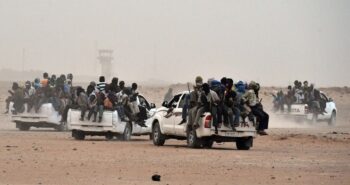Mayors and councillors from a number of municipalities have accused the country’s political leaders of turning their backs on the needs of ordinary Libya people.
They made the accusations at a forum this week in Tunis on the role of the municipalities in bringing about peace in Libya at the local level.
The mayors of Janzour, Zintan and Ghayan as well as councillors from central Tripoli, Zultan, Misrata and elsewhere complained that the country’s leading politicians had done nothing to help municipalities deliver services to local people.
“They have stolen the efforts for peace,” said Mustafa Barouni, mayor of Zintan, accusing them of moral corruption. “They do not feel the pain and sufferings of ordinary people,” he said, referring to endless electricity and water cuts, the lack of money in the banks and rising prices.
There was repeated criticism of the Presidency Council’s government of national accord (GNA) in Tripoli from all the the municipal representatives for not providing the funds to carry out the councils’ work.
The mayor of Gharyan, Yousef Ibderi, went further, accusing it of ignoring his municipality’s requests for help. Officials did not reply when contacted about the town’s problems.
Faraj Aban, the mayor of west Tripoli suburb of Janzour, was equally scathing. Because of the incompetence and irresponsibility on the part of the Tripoli authorities, people did not have access to healthcare, decent education for their children, money in the banks, security.
The GNA was a “fiasco and a failure,” he said, adding that “only the Libyan people can build peace. We shouldn’t wait for peace to come from abroad, we must do it ourselves, and municipalities will play a role of paramount importance”.
As a result of the chaos, he added, young people were turning to crime.
“What do you expect from a young man whose father cannot afford to feed the family?” he asked.
“We are creating a new generation of criminals”, he said, because of the authorities’ failure to carry out their responsibilities.
Both he, Barouni and Naser Alkriwi from central Tripoli municipality said that as a result, ordinary people looked increasingly to municipal councils to provide services. But without the resources it was difficult to provide them.
“There are high expectations on the part of the citizens [towards the municipalities]” said Alkriwi. In the absence of action by the central authorities, people were looking to the them to provide salaries, funding and a range of services, he said. And despite the crisis, his own municipality was providing more facilities even though, officially, they were outside its remit.
The issue of the municipalities’ remit saw an impassioned plea from Barouni for greater powers.
Many local services were outwith municipal councils’ authority, he pointed out, such as cleansing and the local civil guards. However, local people were completely unaware of it. “This needs to be resolved”, he said. “We need proper decentralisation.” But, he added, the central authorities were not interested. They wanted the municipalities to be weak.
Gharyan’s Ibderi, who still has to use a walking stick as a result of an injury to his leg in an assassination attempt in January last year, warned that the municipalities would outlast the GNA, however. Its tenure would run out in December, he said. But they would still be there, trying to bring peace to the country.
The mayors hit out at others, not just the GNA and the leading Libyan political players.
Ibderi used the occasion to attack the UNDP. It had done nothing to help his town despite requests, he said. Speaking to the Libya Herald afterwards, he said that it was not only Gharyan that the UNDP had ignored. He accused it of ignoring all Libyan municipalities.
The title of the forum was Supporting the role of municipalities, civil society organisations and citizens in building peace at local level. With mayors or representatives from eleven municipal councils attending plus numerous local Libyan civil society activists, there was considerable belief on their part that, with the country’s political leaders unable or unwilling to take the necessary steps to make peace happen, local communities had to try to make it happen.
There was criticism from Barouni, though, of Libyan attitudes to foreigners. There was a culture in Libya of non-acceptance of others, he said–and it was one that was fuelled by local media.
“People say that if we were left alone by foreign bodies we would be able to solve our problems. This is not true,” he insisted. “Foreign countries did not compel us to fight each other,” he said, noting that in 2015 when UNSMIL organised meetings between Libyan politicians, they refused to sit at the same table.
“Foreign bodies are scapegoats, being used to blame for our own problems.”
Appealing for help to change people’s mindset of mistrust, he called for resources to build dialogue at local levels. Municipalities like his needed to spread a culture of dialogue, particularly among young people. They were open to dialogue, he said. Libya would have to rely on its youth for it to rebuild.
There was support for this from the EU and Dutch ambassadors, Bettina Muscheidt and Eric Strating. “Libya needs peace,” said Strating. It would ensure employment, power, water and money in the banks among other things. But, he added, peace was not being delivered by the top level. Because of this, other entities had to step in – the municipalities, civil society and women’s organisations, tribes, and various other groups.
“The municipalities and civil society are an example to all of Libya and to political leaders that you are the best Libya can bring to the table when showing what peace in Libya will look like,” said Muscheidt.
The forum was organised by the Libya Local Governance and Stabilisation Programme, supported by the Dutch government, Dutch local authorities’ association VNG International and its Tunis subsidiary CILG, Romanian peace institute Patrir, and the EU.
___________




